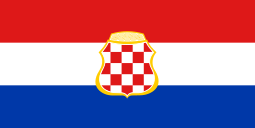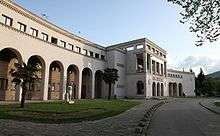Croatian National Assembly
Croatian National Assembly[1][2] (Croatian: Hrvatski narodni sabor) is a political organisation of Croat political parties in Bosnia and Herzegovina. The organisation serves as a platform to coordinate political and cultural activities of different parties and stakeholders in the Croatian community and to promote the initiative to create a federal unit with Croatian majority in the country.
Hrvatski narodni sabor Bosne i Hercegovine | |
 | |
| Abbreviation | HNS BiH |
|---|---|
| Formation | 28 October 2000 |
| Type | political platform |
| Purpose | coordinating Croatian politics |
| Headquarters | Mostar |
| Location | |
Official language | Croatian |
Chairman of the Presidency | Dragan Čović |
Chairman of the General Secretariat | Božo Ljubić |
Main organ | General assembly |
| Website | hnsbih |
History
In 2000, the Office of the High Representative in the country imposed amendments to the Federation's constitution and its electoral law, complicating its structure and impairing the parity and power-sharing between Bosniaks and Croats that was up until then in force in the Federation. Dissatisfied Croat politicians led by Ante Jelavić and HDZ set up a separate Croatian National Assembly on October 28 in Novi Travnik,[3] held a referendum parallel to the elections and proclaimed Croatian federal unit in Croat-majority areas in the Federation (Croatian Self-Government or Self-Rule, Hrvatska samouprava). Croatian Self-Government was supposed to be a temporary solution until the controversial amendments and election rules are overturned. CNA's attempt ended shortly after a crackdown by SFOR and judiciary proceedings.[4]
The controversial rules, dismantling checks and balances the Federation's Croats and Serbs had on the Federal legislature as well as the executive, particularly government-building, remained in rule. In 2010-14 Federation's Government was formed and Federation's president appointed without the consent of Croat deputies in the House of Peoples, receiving just 5 votes of confidence out of 17. In March 2011 country's Central Electoral Commission declared HoP's composition and decisions to be illegal, but the High Representative Valentin Inzko suspended CEC's decision.[5] After Croatian politician Božo Ljubić filed an appeal, finally, in December 2016 Constitutional Court of Bosnia and Herzegovina found the election system of the deputies in the House of Peoples unconstitutional and abrogated the controversial rules.[6] Croatian National Assembly was thus reactivated in April 2011 in Mostar[7] and started pushing for the reorganization of country and Federation, the change of the electoral system and a public broadcasting system in Croatian language, focused on Bosnian Croats.[8]
Political positions
Dissatisfied with the representation of Croats in the Federation, Croat political parties insist on creating a Croat-majority federal unit instead of several cantons. SDA and other Bosniak parties strongly oppose this.[9]
In the 2014 Bosnia elections, most of the parties participating in CNA's work (HDZ BiH, HSS SR, HKDU BiH, HSP "dr. Ante Starčević" and HSP HB) formed a joint electoral coalition to contest the entity and state parliamentary elections as well as the elections for the Croat member of the state presidency.[10] They won 14 out of 17 Croat seats in the House of Peoples in Federation's Parliament and 4 out of 5 Croat seats in the State House of Peoples, together with 19 seats in Federation's and 14 in State House of Representatives, respectively.
In January 2017, Croatian National Assembly stated that “if Bosnia and Herzegovina wants to become self-sustainable, then it is necessary to have an administrative-territorial reorganization, which would include a federal unit with a Croatian majority. It remains the permanent aspiration of the Croatian people of Bosnia and Herzegovina.”[11]
Structure


CNA has a 29-member Presidency, headed by Dragan Čović. CNA's 13-member General Secretariat is chaired by Božo Ljubić as the president, while secretary-general is Josip Merdžo. The members of the General Secretariat are heads of CNA Departments. Presidency and General Secretariat are main bodies of CNA between its assembly sessions.
The members of CNA are all Croats who are elected
- deputies in cantonal assemblies in the Federation,
- deputies in the Parliament of the Federation of Bosnia and Herzegovina,
- mayors of cities, towns and municipalities,
- deputies in the Parliament of Bosnia and Herzegovina,
- cabinet ministers in the Federation, Republika Srpska or in the Council of Ministers of Bosnia and Herzegovina.
Departments
CNA has twelve departments:[12]
- Department of legal and constitutional affairs,
- Department of financial affairs,
- Department of economic affairs,
- Department of infrastructure, communications and planning,
- Department of international relations,
- Department of science and education,
- Department of culture, media, sport and information,
- Department of HVO veterans,
- Department of intelligence and national security,
- Department of diaspora,
- Department of WWII and Homeland War affairs,
- Department of social affairs and NGO coordination
Members
Political parties supporting the work of Croatian National Assembly and whose members participate in its operations are:[13]
- Croatian Democratic Union of Bosnia and Herzegovina
- Croatian Democratic Union 1990
- Croatian Party of Rights of Bosnia and Herzegovina
- Croatian Peasant Party of Stjepan Radić
- Croatian Peasant Party of Bosnia and Herzegovina
- Croatian Party of Rights dr. Ante Starčević of Bosnia and Herzegovina
- Croatian Christian Democratic Union of Bosnia and Herzegovina
- Croatian Democratic Union
- Croatian List for Livno
See also
References
- Belloni 2008, p. 55.
- Tesser 2013, p. 1962.
- Radenko Udovičić: "Bosnia and Herzegovina: SEEKING A NEW STATUS", Network of Independent Journalists, Issue No. 197. - November 3, 2000.
- Interview: Wolfgang Petritsch, the High Representative for BiH; "I don't want the Croats in a ghetto called Third Entity", ohr.int
- "Bosnia and Herzegovina, Freedom in the World in 2012", Freedom House
- Rose, Eleanor: "Bosnian Court Ruling Lends Weight to Croat Agitation", Balkan Insight, 15 Dec 16
- Eldin Hadzovic: "Bosnian Croats Form National Assembly", balkaninsight, 9 Apr 2011
- Bosnia's Future, pp. 37-8
- Krešić Zoran: "HNS jedina hrvatska koalicija na izborima", vecernji list, July 2014
- Rose, Eleanor: "Bosniaks Slap Down Calls for Bosnian Croat Entity", Balkan Insight, January 30th, 2017
- "Glavno vijeće", hnsbih.org. Accessed February 18th, 2017
- Članice, hnsbih.org, February 2017
Sources
- Belloni, Roberto (2008). "State Building and International Intervention in Bosnia". London: Routledge. ISBN 9781134059683.CS1 maint: ref=harv (link)
- Tesser, Lynn (2013). "Ethnic Cleansing and the European Union: An Interdisciplinary Approach to Security, Memory and Ethnography". Basingstoke: Palgrave Macmillan. ISBN 9781137308788.CS1 maint: ref=harv (link)